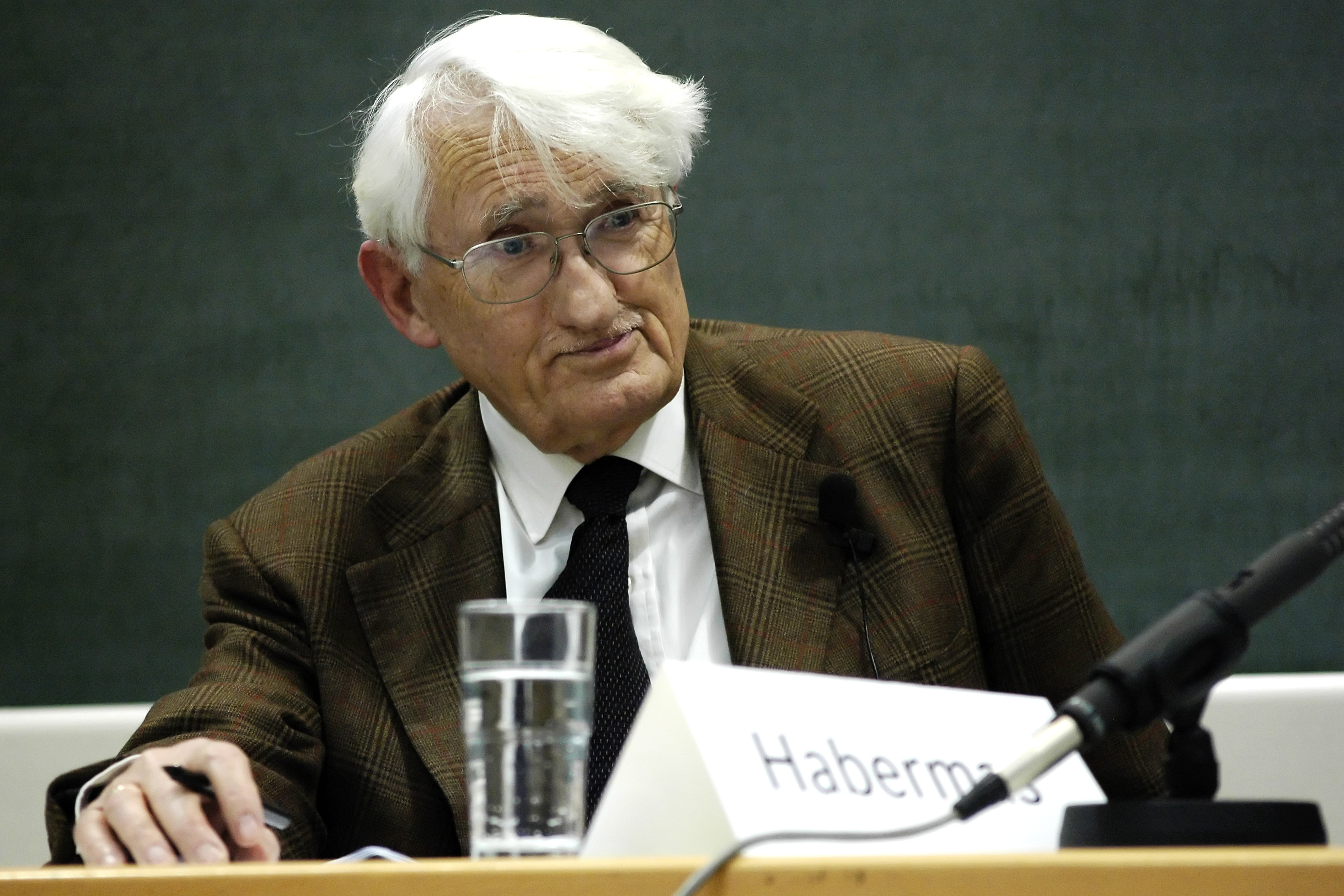Die Neue Unübersichtlichkeit, Frankfurt a.M. 1985. ISBN 3-518-11321-6
Werk
Theorie des kommunikativen Handelns
Jürgen HabermasStrukturwandel der Öffentlichkeit
Jürgen HabermasJürgen Habermas Berühmte Zitate
Wahrheitstheorien. In: Helmut Fahrenbach (Hrsg.): Wirklichkeit und Reflexion. Walter Schulz zum 60. Geburtstag. Neske, Pfullingen 1973, ISBN 3-7885-0037-9, S. 218.
„Der einzige Patriotismus, der uns dem Westen nicht entfremdet, ist ein Verfassungspatriotismus.“
Eine Art Schadensabwicklung: Die apologetischen Tendenzen in der deutschen Zeitgeschichtsschreibung, Die Zeit Nr. 29, 11. Juli 1986. S. 40. zeit.de http://www.zeit.de/1986/29/eine-art-schadensabwicklung/komplettansicht
über Theodor W. Adorno, Die Neue Unübersichtlichkeit, Frankfurt a.M. 1985. ISBN 3-518-11321-6
Strukturwandel der Öffentlichkeit, S. 44. Neuauflage, Frankfurt am Main, 1990. ISBN 3-518-28491-6
Theorie des kommunikativen Handelns, Bd. 2, S. 507f. Frankfurt a.M. 1981, ISBN 3-518-28775-3
Jürgen Habermas Zitate und Sprüche
Die Neue Unübersichtlichkeit. Frankfurt a.M. 1985. ISBN 3-518-11321-6 S. 157 books.google http://books.google.de/books?id=OMoUAQAAIAAJ&q=beraubt
Protektionismus: Sind wir noch gute Europäer?, Die Zeit Nr. 28, 05. Juli 2018. zeit.de https://www.zeit.de/2018/28/protektionismus-europa-grenzen-rueckzug-herausforderungen
Jürgen Habermas: Zitate auf Englisch
Habermas (1979) cited in: Werner Ulrich (1983) Critical heuristics of social planning. p. 123
Quelle: Knowledge and Human Interests, 1971, p. 310 as cited in: Dominick LaCapra (1983) Rethinking Intellectual History: Texts, Contexts, Language. p. 170
Habermas (2004) in: Giovanna Borradori (2004) Philosophy in a Time of Terror: : Dialogues with Jurgen Habermas and Jacques Derrida. p. 34
Habermas (2006) "Conversation about God and the World." Time of transitions. Cambridge: Polity Press, p. 150-151.
Quelle: The Structural Transformation of the Public Sphere, 1963/1991, p. 222
Quelle: The Structural Transformation of the Public Sphere, 1963/1991, p. 27
Habermas (2003) The Future of Human Nature. p. 10
Quelle: Knowledge and Human Interests, 1971, p. 301
Quelle: Knowledge and Human Interests, 1971, p. 266
Quelle: The Structural Transformation of the Public Sphere, 1963/1991, p. 7 as cited in: Benedetto Fontana, Cary J. Nederman, Gary Remer (2004) Talking Democracy: Historical Perspectives on Rhetoric and Democracy. p. 222
Quelle: On the Pragmatics of Communication, 1998, p. 23
Quelle: The Structural Transformation of the Public Sphere, 1963/1991, p. 1 as cited in: Gandy, M (1997) "Ecology, modernity and the intellectual legacy of the Frankfurt School". In: Light, A and Smith, JM, (eds.) Space, Place and Environmental Ethics. p. 240
Habermas (1998) The Inclusion of the Other: Studies in Political Theory. Ciaran Cronin and Pablo De Greiff, eds. Cambridge, MA: The MIT Press.
Quelle: The Structural Transformation of the Public Sphere, 1963/1991, p. 65
Quelle: Moral Consciousness and Communicative Action (1983), p. 5
Quelle: On the Pragmatics of Communication, 1998, p. 21
Habermas (1993) "Further reflections on the public sphere", in: Craig Calhoun Eds. Habermas and the Public Sphere. MIT Press. p. 441
Quelle: Knowledge and Human Interests, 1971, p. 4
Quelle: The Theory of Communicative Action, 1987, p. 308
Quelle: Moral Consciousness and Communicative Action (1983), p. 26
Habermas (1972) "Sprachspiel, intention und Bedeutung. Zu Motiven bei Sellars und Wittgenstein". In R.W. Wiggerhaus (Ed.) Sprachanalyse and Soziologie. Frankfurt: Suhrkamp). p. 334
This is called the paradoxical achievement of intersubjectivity
Quelle: The Structural Transformation of the Public Sphere, 1963/1991, p.xvii
Quelle: On the Pragmatics of Communication, 1998, p. 22
Quelle: Knowledge and Human Interests, 1971, p. 4
